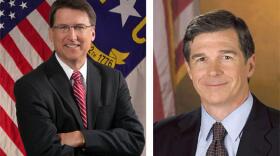The presidential race between Hillary Clinton and Donald Trump will top the ballot for voters this November. But other races will also be important to North Carolina voters, including the race for Governor, U.S. Senate, Attorney General and state Supreme Court. Here's a guide to sift through the important questions as voting gets underway.
Early voting, voter ID and legal challenges - where does it all stand?
In mid-September, the State Board of Elections reached compromises on more than 30 county disputes over the scope of early voting.
Voters will also have an extra week of early voting that was reinstated for this election after an appeals court struck down the voter ID law this summer.
Related: Early Voting Disputes Mostly Settled, Concerns Remain
The decision from the Fourth Circuit Court of Appeals extended early voting from 10 days back to 17 days. Local elections boards had to come up with new plans for that week, with some providing fewer hours of early voting than others. A group of voters sued to expand those hours, but the same appeals court rejected their request earlier this week.

How can I find out what my voter registration status is?
The North Carolina State Board of Elections offers a public voter search on its website where voters can check whether they’re currently registered, removed or denied. Voters can also contact their county board of elections here. They can also register and vote on the same day during early voting.
Who is eligible to vote early?
Starting on October 20, all North Carolina counties have to open at least one location for early voting. Any voter in the county can use any of the early voting sites in that county. Voters must be registered to vote in that county in order to vote early, but same-day registration is also available during early voting.
What is the early voting period?
Early voting begins on the second Thursday before Election Day and ends at 1 p.m. on the last Saturday before the election.
How can I find out where I can vote early?
Early voting is not uniform across the state, and differences will depend on where voters live. Voters can find an early voting site at the North Carolina State Board of Elections website. Voters can also check with their county board of elections for information on where to vote early.

Can voters write-in candidates on the ballot?
Yes. According to the State Board of Elections, candidates must qualify via a petition in order for a line to appear on the ballot in the contest. In the upcoming General Election, there will be a write-in line for the statewide contests of U.S. President and N.C. Commissioner of Labor, as well as other local partisan contests. Only a certified (qualified) write-in candidate’s votes will be counted in these contests. That means only votes for Green Party presidential candidate Jill Stein and state Commissioner of Labor candidate Brian (BK) Wayne will be counted, respectively.
Do I need an ID to vote?
No. In July, a panel of the U.S. Court of Appeals for the Fourth Circuit struck down the state’s photo ID requirements. Governor Pat McCrory requested a stay in the law, but the U.S. Supreme Court deadlocked in a 4 to 4 vote. That means voters will not have to show an ID at polls during early voting or on Election Day.
How do I know where to vote on Election Day?
Voters can find their Election Day polling place by searching the State Board of Elections site here.
What time do polls open and close on Election Day?
All North Carolina polling places will be open from 6:30 a.m. to 7:30 p.m. on Election Day. As long as voters are in line by 7:30 p.m., they'll be allowed to vote.
What are the big races on my ballot?
President: Hillary Clinton & Donald Trump
Governor: Pat McCrory & Roy Cooper
US Senate: Richard Burr & Deborah Ross
Attorney General: Josh Stein & Buck Newton
State Supreme Court: Mike Morgan & Bob Edmunds
Curious about what the ballot will look like? Here’s a sample ballot for a voter in Durham County.
Where can I get more information on the parties?
More information: NC Republican Party
More information: NC Democratic Party
Copyright 2016 North Carolina Public Radio








